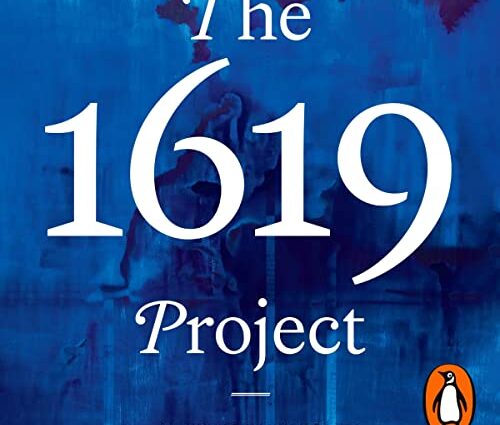Table of Contents
- 📚 Book Details
- 🚀 Book Wrap-Up
- 🎨 Should You Read The 1619 Project?
- 📒 My Book Notes on The 1619 Project
- I. Historical Context and Analysis
- II. Key Themes and Arguments
- III. Contributions to Historical Discourse
- IV. Impact on Contemporary Understanding
- V. Critical Reception
📚 Book Details
- Title: The 1619 Project: A New Origin Story
- Author: Nikole Hannah-Jones
- Pages: 592
- Language: English
- Publisher: One World
- Publication Date: November 16, 2021
- Genre: Non-Fiction, History, Politics
🚀 Book Wrap-Up
“The 1619 Project: A New Origin Story” is a profound and transformative work by Nikole Hannah-Jones, expanding upon the Pulitzer Prize-winning project launched by The New York Times. This book reexamines the foundational narrative of American history by placing the year 1619—the arrival of the first enslaved Africans in the British colonies—at its center.
The core thesis of the book is that the true founding of America began in 1619 with the arrival of enslaved Africans, fundamentally shaping the country’s history, economy, and culture. By integrating essays from a diverse group of historians, scholars, and journalists, the book redefines traditional historical narratives and addresses the deep-rooted impact of slavery on American society.
“The 1619 Project: A New Origin Story” offers a sweeping look at how the legacy of slavery continues to influence contemporary American life, including politics, culture, and social justice. This expanded edition includes additional essays, analyses, and reflections, providing a comprehensive and detailed exploration of its themes.
🎨 Should You Read The 1619 Project?
“The 1619 Project: A New Origin Story” is essential reading if you:
- Are Interested in a Re-examined Historical Narrative: The book challenges the conventional view of American history by emphasizing the impact of slavery and systemic racism. If you seek a deeper understanding of U.S. history beyond the traditional 1776-centric view, this book is for you.
- Want to Explore the Legacy of Slavery: It provides an in-depth look at how slavery has shaped modern America, influencing everything from the economy to social policies and cultural norms.
- Are Engaged in Social Justice: For those committed to understanding and addressing racial inequalities and systemic injustices, this book offers valuable insights and historical context.
However, this book might not be ideal if:
- You Prefer Conventional Historical Accounts: The book’s focus on the 1619 perspective may challenge established historical narratives, which could be controversial for some readers.
- You Are Sensitive to Heavy Themes: The exploration of slavery and systemic racism involves intense and potentially distressing themes, which may be difficult for some readers to engage with.
In summary, “The 1619 Project: A New Origin Story” is a groundbreaking book that provides a new lens through which to view American history and its present-day implications. Its comprehensive analysis makes it a crucial read for anyone interested in the intersection of history, race, and social justice.
📒 My Book Notes on The 1619 Project
I. Historical Context and Analysis
- 1619’s Significance: The book argues that the year 1619, marking the arrival of the first enslaved Africans in what would become the United States, should be considered the true beginning of American history. This reorientation challenges the traditional emphasis on 1776 and the founding fathers, suggesting that America’s foundational narrative is deeply intertwined with the history of slavery.
- Reframing Historical Events: The book reassesses major historical events, including the American Revolution, the Civil War, and the Civil Rights Movement, through the impact of slavery. This fresh perspective aims to provide a more accurate and inclusive historical account.
II. Key Themes and Arguments
- Legacy of Slavery: One of the primary themes is how the institution of slavery has left an indelible mark on American society. The book explores the ways in which slavery has influenced the country’s economic systems, cultural norms, and social structures.
- Economic Impact: The essays detail how enslaved labor contributed significantly to America’s economic development, creating wealth and power structures that continue to affect economic disparities today.
- Systemic Racism: The book delves into the enduring nature of systemic racism, arguing that many contemporary issues, from mass incarceration to economic inequality, have roots in the legacy of slavery.
III. Contributions to Historical Discourse
- Innovative Framework: By centering 1619 as the beginning of American history, the book offers an innovative framework that challenges traditional historical narratives. This reframing aims to provide a more accurate and comprehensive understanding of American history.
- Diverse Perspectives: Contributions from various scholars and writers provide a multifaceted view of how slavery and its legacy have shaped American life. This diversity of voices enriches the book’s analysis and broadens its historical scope.
IV. Impact on Contemporary Understanding
- Educational Reform: The book has sparked discussions about the need for educational reform to incorporate more diverse and accurate historical perspectives. It encourages a re-evaluation of how history is taught in schools and highlights the importance of including marginalized voices.
- Cultural Reflection: “The 1619 Project” encourages readers to reflect on how historical injustices continue to affect contemporary societal structures. It challenges readers to consider how the legacy of slavery influences modern social and economic inequalities.
V. Critical Reception
- Praise: The book has been praised for its bold reexamination of American history and its contribution to historical discourse. Critics have lauded its thorough research, compelling essays, and the way it addresses systemic racism.
- Criticism: Some critics argue that the book’s focus on 1619 as the central starting point of American history may oversimplify complex historical narratives. Additionally, certain readers may find its portrayal of systemic racism and historical impact challenging or controversial.
🔍 Review of The 1619 Project
“The 1619 Project: A New Origin Story” by Nikole Hannah-Jones is a transformative and insightful book that redefines the American historical narrative. By focusing on the year 1619, the book shifts the center of American history from 1776 and offers a new perspective on how slavery has shaped the United States.
The book’s strength lies in its comprehensive analysis and the diverse voices it includes. Each essay contributes to a broader understanding of how slavery and its legacy have influenced various aspects of American life, from the economy to social justice. The expanded edition adds depth and context, making it a valuable resource for anyone interested in American history and the ongoing impact of systemic racism.
While the book has been praised for its innovative approach and thorough research, it has also sparked debate and controversy. Some critics feel that its focus on 1619 as the starting point of American history may overshadow other important historical narratives. Despite this, “The 1619 Project: A New Origin Story” is an essential read for those seeking a deeper and more inclusive understanding of American history.
In conclusion, “The 1619 Project: A New Origin Story” is a groundbreaking work that offers a fresh perspective on American history and its current implications. Its exploration of the legacy of slavery and systemic racism makes it a crucial addition to historical discourse and an important read for anyone interested in social justice and historical accuracy.
💯 My Rating
🌕🌕🌕🌕🌕

